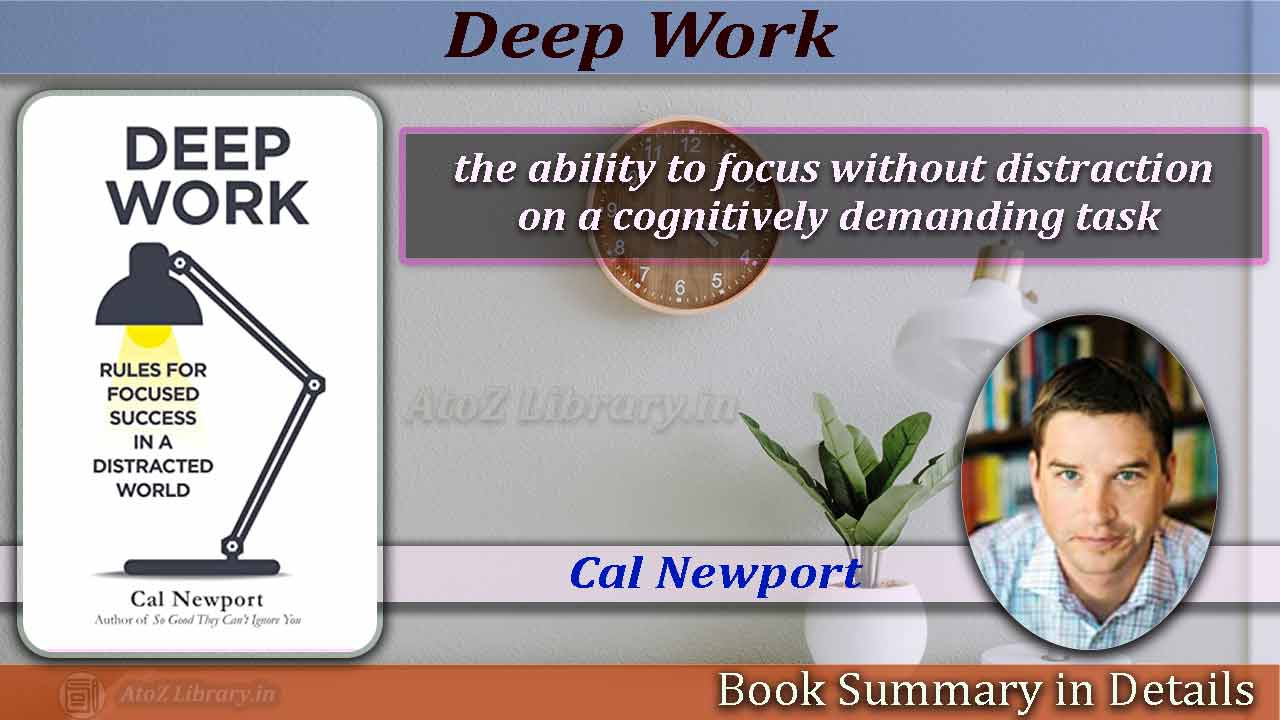Introduction
“Deep Work” is a book written by Cal Newport that was published in 2016. The book is about the importance of developing the ability to focus and concentrate deeply on a task, without distractions, in order to achieve maximum productivity and success. The author argues that our ability to perform deep work is becoming increasingly valuable in today’s world of constant distractions and that by developing this skill, individuals can gain a competitive advantage in their careers and personal lives. Throughout the book, Newport provides tips and strategies for cultivating a deep work practice and offers examples from his own experience and the experiences of others to illustrate the benefits of this approach.
what we can learn from the deep work book
“Deep Work” by Cal Newport offers several key insights and lessons for readers looking to improve their productivity and achieve success in their professional and personal lives. Here are some of the key takeaways from the book:
- The value of deep work: The book argues that the ability to perform deep, focused work without distractions is becoming increasingly valuable in today’s knowledge economy and is critical for success in both professional and personal life.
- The dangers of shallow work: Newport also highlights the dangers of shallow work, or work that can be performed while distracted, and argues that this type of work should be limited in order to make room for deep work.
- The benefits of deep work: Throughout the book, Newport outlines the many benefits of deep work, including increased productivity, creativity, and job satisfaction.
- Strategies for cultivating a deep work practice: The book provides practical tips and strategies for developing a deep work practice, including setting clear goals, creating a deep work schedule, and limiting distractions.
- Balancing deep work with rest and rejuvenation: Newport also emphasizes the importance of balancing deep work with rest and rejuvenation, as overdoing deep work can lead to burnout and decreased productivity.
Overall, “Deep Work” provides a comprehensive guide to developing the ability to focus deeply and perform tasks without distractions, and offers valuable insights and strategies for achieving success in a world filled with distractions.
Read:- The Effective Executive Summary
about the author
Cal Newport is an Associate Professor of Computer Science at Georgetown University and the author of several popular books on productivity, work, and technology. He is known for his insights on developing a focused and productive work style in an age of digital distractions. Newport has a PhD in Electrical Engineering and Computer Science from MIT, and his research focuses on the intersection of technology and productivity.
His book “Deep Work” was published in 2016 and quickly became a best-seller, attracting attention from professionals and students alike. In “Deep Work,” Newport argues for the importance of developing the ability to focus deeply and perform tasks without distractions in order to achieve maximum productivity and success. He also provides practical tips and strategies for cultivating a deep work practice and overcoming the challenges that come with it.
In addition to his academic and writing careers, Newport is a sought-after speaker and consultant, advising organizations on how to improve their productivity and work practices. His work has been featured in a variety of media outlets, including The New York Times, The Wall Street Journal, and NPR.
The idea” from Deep Work book
This chapter lays out the central idea of the book and provides a foundation for the subsequent chapters. In this chapter, Cal Newport defines deep work as “professional activities performed in a state of distraction-free concentration that push your cognitive capabilities to their limit.” The author argues that deep work is becoming increasingly valuable in today’s knowledge economy as the majority of tasks can be automated or outsourced, leaving only the tasks that require deep thinking and problem-solving to be done by humans.
Newport also highlights the benefits of deep work, such as increased productivity and creativity, and explains how these benefits translate into success in professional and personal life. Additionally, he argues that shallow work, defined as work that is easy to replicate and can be done while distracted, is becoming less valuable and should be limited in order to make room for deep work.
The author also outlines the challenges that come with deep work, such as the tendency to get bogged down in distractions, and provides tips for overcoming these challenges. He stresses the importance of setting clear goals, creating a deep work schedule, and avoiding shallow work to cultivate a deep work practice.
Read:- Money Master the Game A Comprehensive Summary: Unlock Your Financial Success
Deep work is valuable
In this chapter the author argues that deep work is becoming increasingly valuable in today’s knowledge economy. He explains that as more tasks are being automated or outsourced, deep work has become the only way for individuals to distinguish themselves and add value in their professional lives.
Newport provides evidence for the value of deep work by discussing its benefits, such as increased productivity and creativity, and explaining how these benefits contribute to success. He also cites examples of successful individuals, such as Bill Gates and J.K. Rowling, who have relied on deep work to achieve their goals.
The author also contrasts deep work with shallow work and argues that shallow work is becoming less valuable. He explains that shallow work, which can be easily replicated and performed while distracted, is becoming commoditized and therefore less valuable.
In conclusion, the chapter “Deep Work is Valuable” provides a strong argument for the importance of deep work in today’s knowledge economy. By focusing on deep work and limiting shallow work, individuals can increase their productivity and creativity, and achieve success in their professional lives.
Deep work is rare
The Chapter explores the declining presence of deep work in today’s society and argues that it is becoming increasingly rare. The author explains that the rise of technology and the Internet has made it easier to be constantly connected and distracted, leading to an increase in shallow work and a decline in deep work.
Newport also discusses the concept of “network tools,” such as social media, email, and messaging apps, which have created a ” culture of connectivity ” that has made deep work difficult to achieve. He argues that these tools have made it easier to get caught up in shallow work and distractions, making it harder to focus on deep work.
The author also highlights the fact that many individuals and organizations have embraced shallow work and are not putting in the effort to cultivate a deep work practice. He explains that the trend towards shallow work has made deep work more valuable, but also more difficult to achieve.
Deep work is meaningful
the author argues that deep work is not only valuable but also meaningful. He explains that deep work provides individuals with a sense of purpose and fulfillment by allowing them to create something of value and make a significant impact in their professional lives.
Newport highlights the idea that deep work can bring about a sense of meaning and purpose in one’s work, by providing the opportunity to work on challenging problems and create something of value. He also discusses the idea that deep work can provide individuals with a sense of control over their professional lives, as they are able to focus on what they find most meaningful and make a tangible impact.
The author also touches upon the idea that deep work can be a source of personal fulfillment and satisfaction. He explains that deep work provides individuals with the opportunity to push their cognitive abilities to their limits and develop new skills, leading to a sense of pride and satisfaction in their work.
Read:- The 10x Rule Summary: The Only Difference Between Success and Failure
The rules” from Deep Work
The Chapter outlines a set of practical guidelines for individuals looking to cultivate a deep work practice. In this chapter, Newport provides a roadmap for how to effectively implement deep work into one’s daily routine and overcome the distractions and interruptions that often prevent individuals from focusing.
The author introduces several key rules for deep work, including the importance of setting clear and defined goals, prioritizing deep work in one’s schedule, and limiting distractions by creating a focused environment. He also provides practical tips for maximizing productivity and minimizing shallow work, such as using timers and strict schedules, and setting aside dedicated blocks of time for deep work.
In addition, Newport also discusses the importance of developing a deep work routine, explaining that this routine will help individuals to create a habit of deep work and make it easier to stick to over time. He also provides advice on how to overcome common challenges, such as procrastination and burnout, that individuals may encounter when trying to cultivate a deep work practice.
work deeply
Newport explains that deep work requires a state of flow, where individuals are fully engaged and focused on their work without distraction. He argues that this state of flow is crucial for producing high-quality work, and can only be achieved through deep work.
The author also highlights the importance of creating a focused environment that minimizes distractions and allows individuals to work deeply. He provides practical tips for creating a focused environment, such as eliminating distractions, creating strict schedules, and setting aside dedicated blocks of time for deep work.
In addition, Newport discusses the benefits of deep work, including increased productivity, creativity, and job satisfaction. He argues that deep work can lead to better results in a shorter amount of time, and can provide individuals with a sense of purpose and fulfillment in their work.
In conclusion, the chapter “Work Deeply” emphasizes the importance of deep work and the benefits it can bring to one’s professional life. The author provides practical tips for cultivating a deep work practice, and argues that deep work is the key to unlocking one’s full potential and making a significant impact in one’s work.
Read:- The Power Of Subconscious Mind- clear Summary
Embrace boredom”
the author argues that embracing boredom is a critical component of cultivating a deep work practice. He explains that boredom is a signal that one’s mind is seeking stimulation and is a key indicator that it is time to switch to deep work.
Newport explains that in today’s world of constant stimulation, it can be difficult to embrace boredom and allow one’s mind to wander. He argues that in order to cultivate a deep work practice, individuals must learn to embrace boredom and allow their minds to wander in order to come up with creative ideas and new insights.
The author also provides practical tips for embracing boredom, such as setting aside dedicated blocks of time for deep work, avoiding distractions, and practicing mindfulness. He also discusses the importance of creating a schedule that allows for deep work, and avoiding activities that distract from this focus.
Quit Social Media
Here the author argues that social media is a major barrier to deep work and productivity. He explains that social media is designed to be addictive and distracts individuals from focusing on deep work.
Newport argues that quitting social media is a critical step in cultivating a deep work practice. He explains that social media creates an environment of constant distraction, and that individuals must remove this distraction in order to focus on deep work.
The author provides practical tips for quitting social media, such as limiting social media usage, turning off notifications, and avoiding social media when engaged in deep work. He also discusses the benefits of quitting social media, such as increased focus and productivity, and improved mental health.
Overall, the chapter “Quit Social Media” provides a strong argument for the importance of quitting social media in order to cultivate a deep work practice. The author explains that social media is a major barrier to deep work and productivity and that individuals must remove this distraction in order to focus on deep work. By quitting social media and embracing deep work, individuals can increase their productivity and creativity, and make a meaningful impact in their professional lives.
Drain The Shallows
author argues that shallow work is a major barrier to deep work and productivity. He defines shallow work as activities that are easy to understand and replicate, and that do not require significant cognitive engagement.
Newport argues that shallow work is a major drain on one’s time and energy, and that it must be minimized in order to cultivate a deep work practice. He provides practical tips for reducing shallow work, such as limiting email and other distractions, and focusing on the most important tasks first.
The author also discusses the importance of batching shallow work, or grouping similar shallow work tasks together in order to minimize the amount of time spent on these activities. He explains that batching shallow work can help individuals stay focused and avoid distractions, and can free up time for deep work.
In conclusion, the chapter “Drain the Shallows” provides a compelling argument for the importance of minimizing shallow work in order to cultivate a deep work practice. The author explains that shallow work is a major drain on one’s time and energy and that individuals must reduce this type of work in order to focus on deep work. By minimizing shallow work and embracing deep work, individuals can increase their productivity and creativity, and make a meaningful impact in their professional lives.
Read:- Jawaharlal Nehru Biography: Life story Of Jawaharlal Nehru
Conclusion
Throughout the book, Newport provides practical tips for cultivating a deep work practice, such as embracing boredom, quitting social media, reducing shallow work, and establishing a dedicated schedule for deep work. He argues that individuals who embrace deep work will be better equipped to succeed in today’s fast-paced, knowledge-based economy, and that they will be able to make a meaningful impact in their professional lives.
Overall, “Deep Work” is a thought-provoking exploration of the importance of deep work in today’s world and provides practical tips for cultivating a deep work practice. The book is a valuable resource for anyone looking to increase their productivity and creativity, and to make a meaningful impact in their professional lives.





